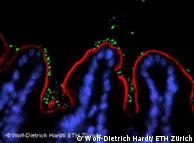Spectrum | 02.09.2008 | 04:30
ETH Zurich Study on Salmonella Self-Destruction
Salmonellosis is an infection with bacteria called Salmonella. Most persons infected with Salmonella develop diarrhea, fever, and abdominal cramps 12 to 72 hours after infection. The illness usually lasts 4 to 7 days, and most persons recover without treatment.
However, in some persons, the diarrhea may be so severe that the patient needs to be hospitalized. In these patients, the Salmonella infection may spread from the intestines to the blood stream, and then to other body sites and can cause death unless the person is treated promptly with antibiotics. And it is precisely how the illness progresses that came under scrutiny in a study undertaken by the Swiss Federal Institute of Technology or ETH Zurich.
Published in the scientific publication, « Nature », ETH Zurich biologists led by Professors Martin Ackermann and Wolf-Dietrich Hardt, in collaboration with Michael Doebeli of the University of British Colombia in Vancouver have described a new biological concept in which self-sacrifice and self-destruction play an important role. According to them, individual cells in a population of bacteria can sacrifice their lives for others to achieve a greater common good. Rajiv Sharma asked Prof. Martin Ackermann how they investigated this unusual biological concept.

沒有留言:
張貼留言